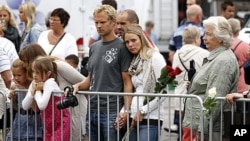The recent shocking tragedy in Norway has highlighted the disconnect between European nations and their Muslim populations. The Norwegian suspected of killing 76 people in Oslo and at a youth camp on a nearby island claims he was on a mission to “save Europe” from a Muslim takeover. Ultra-nationalist Anders Behring Breivik accused the ruling Labor Party that hosted the youth camp of betraying Norwegian culture by encouraging immigration.
A sampling of European analytical opinion shows there is great concern in the region about “accommodating” Islam and immigration in general.
|
Thomas Hylland Eriksen of the University of Oslo spoke to Susan Yackee about religious tolerance in Norway
|
Thomas Hylland Eriksen, a social anthropologist at the University of Oslo, said the suspect’s ideology is quite well known in Norway and has been spreading on websites since the 9/11 terrorist attacks in the United States a decade ago.
He says many Norwegians feel that “Muslims represent an alien culture”, but only a minority hold the view of ultra-nationalists “that Islam is incompatible with democracy.” He says Norway’s July 22 tragedy focuses on the growth of a small new right-wing movement in Europe, which he says must be taken seriously as a future security threat.
Eriksen says there is a drive in Norway to increase religious tolerance. He says it is too early to tell if the mass killings in Oslo will make the people of Norway more accepting of Islam. However, he says “that might certainly be an outcome.”
“Maybe this tragic event will lead to a cleaning of the air where it becomes clear that when you live here you are committed to the country – you’re a citizen – and your religion doesn’t really matter.”
|
Bruce Clark of The Economist spoke about the tragedy in Norway
|
The Norway tragedy created a “palpable increase of tension” in certain European cities, said Bruce Clark who writes on religion, law and ethics for The Economist in London . He says it is going to be a struggle to keep social peace in some towns deeply divided and segregated.
Clark agrees discussion of religion and religious diversity has been brought to the front. He adds “debates around multiculturalism, the integration of immigrants and the ability of religions to live together will become sharper, more tense,” stressing that “attitudes may become more entrenched.”
Tim Ross, the religious affairs editor at the London Daily Telegraph, says there are concerns the attacks in Norway reflect a “growing sense of hostility towards Islam across Europe” and “unease” about how Islam should be incorporated into the European social mainstream. As an example he cites the decision in France to ban the burqa from public spaces.
|
Listen to the comments by Tim Ross of the London Daily Telegraph about the implications for Europe
|
Surveys show that “Islamophobia” in the general public has increased in recent years, Ross said. But he added recent analysis suggests the better educated are less likely to be prejudiced against Islam.
Ross says mutual understanding is crucial to ensuring that tensions are kept to a minimum. He believes European governments, communities and individual citizens should play a role in supporting the message of tolerance towards religions. After all, said Ross, Islam, “is actually a religion of peace.”















